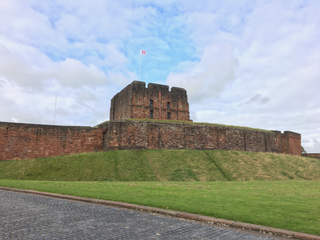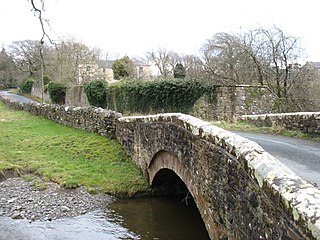Related Research Articles

Carlisle Castle is situated in Carlisle, in the English county of Cumbria, near the ruins of Hadrian's Wall. The castle is over 900 years old and has been the scene of many historical episodes in British history. Given the proximity of Carlisle to the border between England and Scotland, it has been the centre of many wars and invasions. During the Jacobite Rising of 1745-6, Carlisle became the last English fortress to undergo a siege. The castle was listed as a Scheduled Ancient Monument on 7 August 1996.
John Peel was an English huntsman who is the subject of the nineteenth century song "D'ye ken John Peel" - "ken" meaning 'to be aware of' or 'to know' in some dialects of the North of England and Scotland.

Robert V de Brus, 5th Lord of Annandale, was a feudal lord, justice and constable of Scotland and England, a regent of Scotland, and a competitor for the Scottish throne in 1290/92 in the Great Cause. His grandson Robert the Bruce eventually became King of Scots.

The Barony of Kendal is a subdivision of the English historic county of Westmorland. It is one of two ancient baronies that make up the county, the other being the Barony of Westmorland. In 1974, the entire county became part of the modern county of Cumbria and ceased to have an administrative function. At the same time, Kendal borough along with some other rural and urban districts in Westmorland was merged with the neighbouring parts of Lancashire, Furness and Cartmel, and also the Sedbergh Rural District of the West Riding of Yorkshire into the new South Lakeland district of the new county.
William II de Ferrers, 4th Earl of Derby, was a favourite of King John of England. He succeeded to the estate upon the death of his father, William de Ferrers, 3rd Earl of Derby, at the Siege of Acre in 1190. He was head of a family which controlled a large part of Derbyshire which included an area known as Duffield Frith.
Vipont is the name of a prominent family in the history of Westmorland. According to Thomas the name originated in France before 1066 as Vieuxpont, Latinized to de Vetere Ponte, with alternative spellings Vezpont, Veepon, Vexpont, Vypont, Vispont, Vypunt, Vespont, Vipond, Vypond, Voypond, Veepond, Vippond, Vipon, Vipan, Vipen, etc. The Vipont family bore arms: Gules, six annulets or 3:2:1, later quartered by Baron Clifford.
The Musgrave family was a prominent Anglo-Scottish Border family with many descendants in the United States of America, Australia and the United Kingdom a so-called Riding or Reiver clan of Cumberland and Westmorland. The earliest record of the Musgraves is Gamel, Lord of Musgrave, noted as being "of the county of Westmorland and divers manors in county Cumberland, living in the time of King Edward the Confessor (1042-1065) predating the Norman Conquest." The Musgraves though often Wardens of the West March during the times of the Reivers and among the fourteen most notorious of the reiving clans were known locally as de’ils (devils) dozen and consisted of the following families: Armstrong, Bell, Carleton, Dacre, Elliot, Graham, Johnstone, Kerr, Maxwell, Musgrave, Nixon, Routledge, Scott and Storey.
Sir Richard Redman was an English soldier, administrator and politician, being elected as a Member of Parliament representing Yorkshire and later acting as the Speaker of the House of Commons for the Parliament of 1415.
Sir Wilfrid Lawson, 2nd Baronet of Isel was an English politician.
Sir Robert Strickland of Sizergh was an English landowner and politician who sat in the House of Commons in the Parliament of 1624. He supported King Charles I during the Wars of the Three Kingdoms.
Sir Gilfrid Lawson, 9th Baronet, was one of the Lawson Baronets.
William de Lancaster I, or William Fitz Gilbert, was a nobleman of the 12th century in Northwest England during the Anarchy, and the period during which his region was ruled by King David I of Scotland. His position survived the return of English rule under King Henry II, and his most important lordship, which had previously come together under Ivo de Taillebois, would evolve into what was eventually known as the barony of Kendal. According to a document some generations later, he was also referred to as William de Tailboys when younger, and then became "William de Lancaster, baron of Kendal". He died in about 1170.
Robert de Vieuxpont was an Anglo-Norman landowner and administrator in the north of England.
William de Vesci (c.1125–1184) was an Anglo-Norman feudal lord and Sheriff. Born William fitz Eustace at Knaresborough Castle, Yorkshire, the son of Eustace Fitz John and Beatrix de Vesci, he took his mother's surname.
Sir Henry Curwen was an English politician who sat in the House of Commons from 1621 to 1622.
Sir Thomas Parr was an English landowner and elected Member of Parliament six times between 1435 and 1459. He was great-grandfather of Queen Catherine Parr, the sixth wife of King Henry VIII.
Christopher Curwen was an English soldier, administrator and politician.
Sir Richard Lowther of Lowther Hall, Westmorland was an English soldier and official. He was twice High Sheriff of Cumberland and Lord Warden of the West March in 1592.

Isel Hall is an ancient Cumbrian residence that sits on a steep rise on the northern banks of the River Derwent, two miles to the South of Bassenthwaite Lake, three miles east, north-east of Cockermouth, with views over the Lake District fells and Skiddaw. It was once the home of the Lawson family and is a grade I listed building.

John Christian Curwen, born John Christian was an English Member of Parliament and High Sheriff.
References
- Curwen, John F. A History of the Ancient House of Curwen of Workington in Cumberland. Kendal, Cumberland, U.K.: Titus Wilson & Co., 1928.